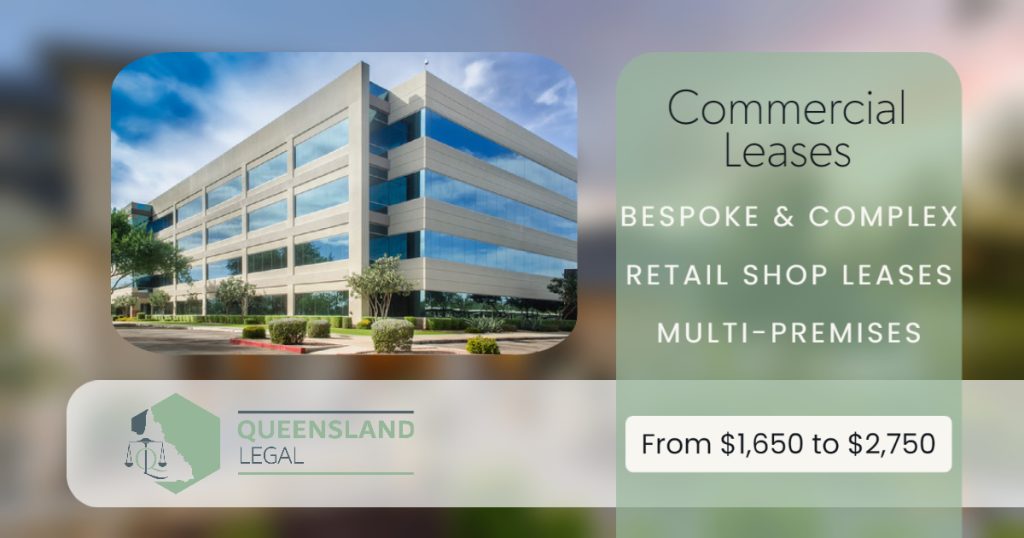A little bit about Commercial Lease Agreements...
What is a Lease?
A lease, or commercial tenancy agreement, is a contract that outlines the terms of how a third party (who does not own the land) will take exclusive possession of a premises (or a part of them) for a certain term, in exchange for the payment of an an agreed fee.
The owner of the land is called the landlord or the lessor.
The third party in possession is called the tenant or the lessee.
The ‘land’ being leased may be vacant, it may be an entire building on the land, or it may be a portion of the land or building.
Finding the Right Tenant.
A subject we think is often overlooked by lawyers when they are engaged in commercial tenancy matters, is to assist in determining if the tenant is the right fit for your premises and is reasonably capable of meeting the payment of rent, outgoings and other costs for the duration they occupy your premises.
Usually, a letting agent will introduce any tenant interested in the space you have available, and help you with the initial negotiations, but they may not concern themselves with the tenants viability to pay rent or fulfil the promises the tenant might make.
In our view, getting the right tenant, is more important that just getting any tenant in place.
Negotiating Terms of the Lease.
When you have found a suitable tenant its time to negotiate the terms of the lease and their occupation of the premises.
Make sure you learn something about the prospective tenant, their business and background first up, before you get into detailed negotiations. There is no point agreeing to great terms of a lease and then finding out the business the prospective tenant wants to use the premises for is unsuitable to you.
Also, be aware that the you may have some disclosure obligations to make to the tenant before they agree to anything. So be sure comply with any of those disclosure obligations so the tenant doesn’t have a way they can get out of an otherwise valid commercial tenancy agreement.
Often, at an early stage (before a full commercial tenancy agreement is drafted) a letter of offer or letter of intention might be drafted to record the essential terms and allow the negotiations to finalise and move the the lease drafting stage.
Process of Entering a Lease
The usual process for entry into the lease is as follows:
- You provide us with a copy of any letter of offer signed.
- We prepare the draft lease for your approval.
- The lease is sent to the tenant or the tenant’s legal advisor for their approval or amendment. For leases covered by the retail shop leases legislation, we also provide the disclosure statement.
- When the terms are agreed and finalised, the tenant (followed by the landlord) will sign the lease, and it becomes legally binding.
- If the term of the lease is more than 3 years, we’ll arrange registration of the lease with the Titles Office.
Legal Costs and Other Fees.
In addition to any obligation to pay rent and outgoings, it is common for a landlord to require the tenant to pay lease registration fees, mortgagee consent fees and the cost of any survey plan to be annexed to the lease.
In some commercial leases, it is also common for the landlord to also require the tenant to pay its legal fees of drafting and producing the lease.
What are the Usual Terms of a Lease?
The terms of any lease are negotiable but the usual terms to consider when thinking of what should be included are:
- The amount of rent: usually expressed as per month or per annum basis.
- Outgoings: what the tenant will pay for rates, taxes, utilities, garbage collection, air conditioning, maintenance, and the like.
- The duration, or term, of the lease: usually included any option to renew the lease and extend the term.
- Rent reviews: a formula for calculating and reviewing the rent to be paid.
- Responsibilities of the tenant: to undertake maintenance, repairs and make good.
- Maintenance by the landlord: to keep common property maintained.
- Insurance required: usually who will pay for it and who obtains it.
- Restrictions: usually on the use of the premises and the removal of fixtures and fittings.
- Default or Breach: the consequences of failing to pay rent or other breaches of the lease.
- Security: what form of security might be given, payment of a security deposit, or bank guarantee.
- Personal Guarantees: the terms of any personal guarantee and indemnity (which is commonly required for directors of a corporate tenant).
Types of Leases
What commercial tenancy agreement to enter into is not necessarily a simple decision. The right choice for can be better determined with the advice of financial and legal professionals.
Different laws and conditions apply depending on the type of business operated at the premises, location of the premises and the length of the tenancy.
Failing to understand your rights and the type of lease may cause you to breach your lease or lose important rights.
Short-Term Lease
A short-term lease is generally considered to be between 12 months and 3 years, without any options to renew them for longer.
Because of their short-term nature, they can provide a landlord with good flexibility if you are considering future development on the land.
The lease terms are generally the same as any commercial lease but we find the parties tend to be a little more flexible in the negotiating terms of a lease that is for a shorter, clearly defined period.
Long-Term Lease
Leasing for longer periods than 3 years is generally considered a long-term lease, and usually include multiple options to renew the term.
A long-term lease will provide more stability for future rent, but will mean the land is exclusively occupied by that third party for a longer period.
The lease will be officially recorded against the title of the land through registration of the lease with the Titles Office.
Retail Shop Lease
If you own premises that are in a retail shopping centre (where five or more retail shops are located), it is likely that the retail shop leases legislation will apply to the lease.
If this is the the case, you’ll need a special lease that complies with all of the obligations under the legislation.
The Retail Shop Leases Act 1994 sets mandatory minimum standards for retail shop leases in Queensland and offers tenants more protection than standard commercial leases.
The legislation covers topics such as disclosure obligations, turnover rent, options to extend, outgoings payable and recovery requirements, rent review mechanisms, trading hours, relocation and demolition procedures, dispute resolution and tenant compensation rights.
If necessary, you will be required to provide a disclosure statement that outlines the most important terms of the lease and other information about the centre.










